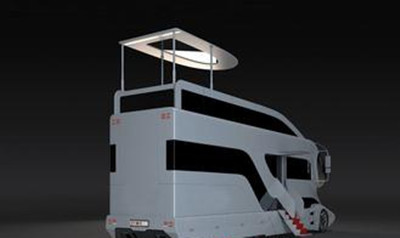倫敦車房
Garage music
車庫音樂
How to make use of unloved urban spaces
怎樣利用被棄置的城市空間
MERIJN ROYAARDS, a musician and architecture student, does not own a car. But for two years he has rented a small garage in east London. Tucked behind a row of shops, it has no electricity, is freezing in winter and stuffy in summer. Yet without any close neighbours it makes an ideal music studio for him and his friends.“ Drummers jump on it,” he grins.
音樂系兼建筑學學生MERIJN ROYAARDS雖然沒有車,但是在過去的兩年中他卻在倫敦東區租了一間小型車庫。車庫在一排商店后面,由于沒有通電的緣故,冬冷夏熱。但是車庫方圓幾里都沒有任何鄰居,這使得其成為一個他和他的小伙伴們十分理想的音樂工作室。“鼓手能夠直接上手,”他咧嘴一笑道。
Owning a car used to mean housing it in a garage—in 1951 one resident of Coventry told the local press that there was “no joy in having a new car if it is going to be exposed to the elements and ruffians to be ruined”. Developers obliged: over half of the homes built between 1919 and 1980 had one. But many are becoming redundant. Between 2002 and 2012 the proportion of vehicles kept in garages at night dropped from 22% to 14%.
擁有一輛車曾經意味著養在車庫中落灰,1951年考文垂的一位居民這樣告訴當地媒體,如果一出門愛車就將面臨著被各種因素或惡棍毀壞的風險,那么擁有一輛新車只會徒添煩惱。據開發商們披露:“建造于1919年至1980年間的房屋之中,有超過一半以上的房屋配備了車庫”。但有許多車庫逐漸變得多余。2002年至2012年期間夜間車庫的存車率從22%下降至14%。

This is partly because some households now have more cars than garage space. But it is also because big modern cars do not fit in older garages, says David Leibling, a transport expert. Few rust when left outside, and many are more difficult to steal: between 2003 and 2013 the number of vehicle thefts in England and Wales fell 76%. Instead, garages now solve a different set of problems. Householders unable to move to larger homes have taken to filling their garages with clutter. Some have become “granny annexes” for ageing parents, says Paul Bishop, who runs a garage conversion company in Bedfordshire. Others house youngsters unable, or unwilling, to leave home.
這一部分是因為現在有一些家庭擁有私家車的數量要比車位要多。不過這又可能是因為大型的現代化轎車與老舊車庫的搭配并不協調,運輸專家David Leibling這樣說道。當車輛停放在街道外面時很少有車會生銹,并且對大部分車來說很難被偷:2003年至2013年期間,英格蘭與威爾士的偷車賊下降了76%。而如今的車庫反而能為我們解決一系列不一樣的問題。無法搬去更大房間的房主們利用車庫來堆放雜物。還有一些車庫被改造成“老人廂房”,專為上了年紀的父母提供便利,在貝德福德郡經營一家車庫改裝公司的Paul Bishop這樣說道。這樣的改裝車庫也提供給一些無法或者是不愿意離開家的年輕人居住。
In desirable parts of London garages can sell for vast sums. But many publicly owned ones lie empty. Of the 6,000 garages owned by Hackney council, around 40% are free. Over 3,000 garages owned by ten housing associations are unused and the land they take up is unfit for building homes upon, says Steve O'Connell, a councillor at the London Assembly. He thinks they could be turned into small offices. That has already happened in places such as Berlin. Boosters hope such projects could be funded from the 9m which Boris Johnson, the mayor of London, has promised to councils who want to spruce up their boroughs.
在倫敦,車庫的合意部分能賣出個好價錢。但是卻有很多公家所有的車庫被空置。哈克尼委員會所有的6000間車庫中有大約40%的車庫是免費使用的。由十家住房協會聯合所有的車庫中有超過3000間是從未用過的,并且車庫所占據的土地也不適合在上面建造房屋,倫敦市議會的議員Steve O'Connell這樣說道。他認為這些車庫都能被改造成小型辦公室,這樣的想法也在很多地方實踐過,比如柏林。支持者們希望這樣的工程能夠得到政府的資金資助,倫敦市市長Boris Johnson曾經向希望整頓區容區貌的委員會做出撥款900萬英鎊的承諾。
But converting garages can be tricky, says Bill Hodgson of University College London. Few councils are enthusiastic enough to truly champion the idea. A recent proposal to turn some garages in north London into shelters for the homeless foundered; councillors feared that local residents would not approve. Getting planning permission can be complex, and developing on local authority land is often fraught. Like the garages themselves, these plans may moulder.
但是改造車庫是一件麻煩事,倫敦大學學院的Bill Hodgson這樣說道。很少有足夠熱情的委員會會真正實施這個想法。最近一項要求將北倫敦的一些車庫改造成流浪者的避難所的申請被拒絕了;議員害怕當地居民不同同意此項議案。獲取計劃的許可是件十分復雜的事,并且要在地方政府土地上發展項目通常是充滿問題的。如同被空置的車庫自身一樣,這些計劃也許也會流產。














